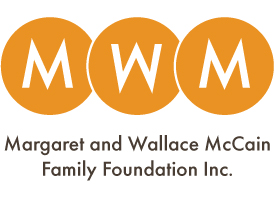
June 2, 2014
St. John's, Newfoundland
My husband and I had a long involvement in personal philanthropy. It wasn’t terribly organized; we made our decisions about giving over the kitchen table. It was my association with Dr. Fraser Mustard in developing the first two Early Years Studies that helped to focus our thinking.
These Studies changed perceptions about early childhood, documenting the social, civic and economic rationale for providing every child with the best possible start in life. This is where our philanthropy could have the greatest impact.
Early human development is a big field, and ours is a small foundation. The science told us that families - nurturing, supportive and supported families -- are critical to a child’s well being. The evidence also told us that we don’t have the tools to intervene in family dynamics.
Where public policy can be effective is through quality early childhood education. Early education for every child became the mission of the Margaret and Wallace McCain Family Foundation.
We chose Atlantic Canada as a focus for our work, in part to give back to Atlantic Canada some of what it has given our family.
The Foundation conducts its work in partnership with governments – and by the way we work with governments of all political stripes – Conservative, Liberal and NDP.
We collaborate with governments and communities to develop sites modeling the effective delivery of early childhood programs. We promote linking ECE programs to schools, to take advantage of the infrastructure that public education offers. These sites are places to ‘touch and see’ what is possible. They help inform public policy and have been scaled up in 4 provinces now, with a view of providing access for all.
The Foundation leverages its reputation to promote dialogue, and to bridge gaps between policy makers and practitioners. It supports efforts to gather and build evidence about early human development.
Good ideas must be shared. This is why communications is at the centre of all our work -- disseminating the best thinking, evidence and strategies among policy makers, stakeholders, practitioners and families.
Wherever possible we collaborate with others, not as a means in itself, but as a strategy to achieve objectives that would be difficult to achieve alone.
This approach helped give birth to the Early Child Development Funders Working Group. We are an association of eight foundations stretching from Alberta to Newfoundland. Some of us are old and some are new; some large, some small. We first met in Toronto five years ago in an exploratory meeting to see how, and if, we could expand the effectiveness of our philanthropy with respect to young children.
There was no prototype. The process evolved with the work. We operate by consensus. Everyone does not need to join everything. Money is not a prerequisite to being part of an initiative.
First a few foundations joined around smaller projects; ultimately we all came together to produce and promote Early Years Study 3. Early Years 3 built on its predecessors and introduced the Early Childhood Education Report, an arms-length monitoring tool to measure progress, province by province, toward our goal of quality early education for all.
The group’s diverse portfolio includes the Muttart Foundation’s ongoing commitment to child care access; the voice and space for innovation particularly with First Nations communities supported by the McConnell Foundation. Regional foundations such the Pratt and Hallman are facilitating new studies, and identifying and promoting new voices for early childhood. Among its extensive work, the Lawson Foundation supports capacity building in the sector. The Atkinson Charitable Foundation has forged a link between early education and decent work for educators. And the influence of the Chagnon Foundation can be seen in the transformation of Quebec’s family policy landscape.
We adopted a common goal – publicly-funded, early education for every child – available, high quality and voluntary. This objective underpins our respective agendas for democracy, equity and social justice.
The powerhouse that came behind the Early Years Study 3 realized much more than we initially imagined. Through the group’s networks every provincial and territorial government has been briefed on the report and is findings. To date over 100 public presentations have been made and even more media interviews given. Collaborations have extended internationally to include the Organization for Economic Cooperation and Development, UNICEF, the Aga Khan and other foundations who are promoting the findings internationally.
Most compelling, the ECE Report is getting results. Policy makers are applying the advice it provides to revamp their early childhood services.
PEI Premier Robert Ghiz credited his government’s association with us for taking PEI from near the bottom, to among the country’s top performers in the provision of early childhood education. In Newfoundland, your minister referenced the Report in announcing new investments for child care and more recently, in launching full day kindergarten. Nova Scotia’s and Ontario’s child care modernization efforts has been influenced by its messages.
The group continues to support the production of the Early Childhood Education Report, which is due for release again in October 2014. We also benefit through our shared experiences.
We adapt one another’s tools for local use.
We have gained a new understanding of the vast regional variations in values and approaches that make up Canada.
We are energized by the successes of our joint ventures.
Most importantly, we have new colleagues, indeed new friends, who are available to us as we remind policy makers of their time-sensitive task of helping to prepare our youngest citizens today, for the Canada of tomorrow.
